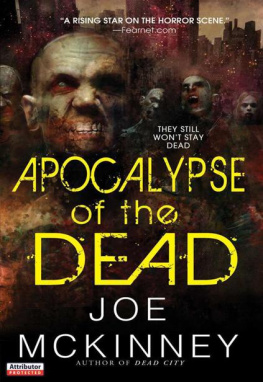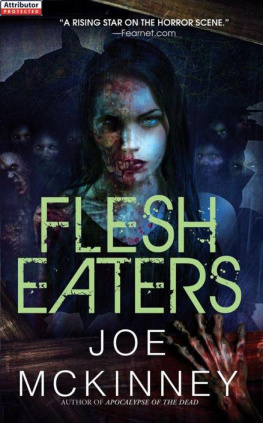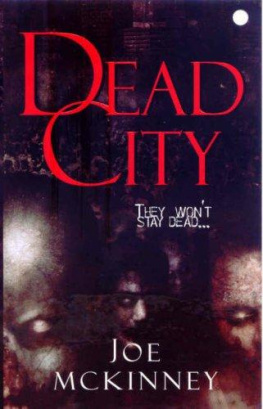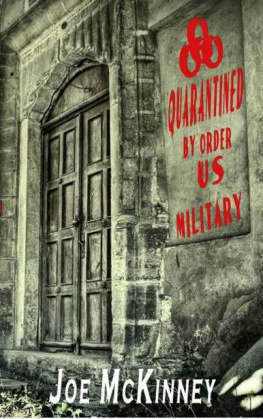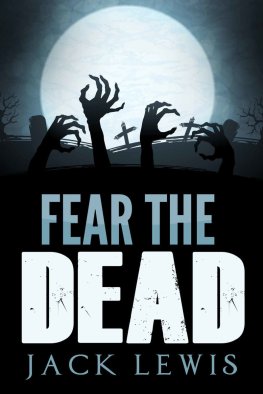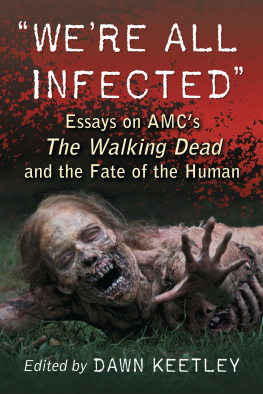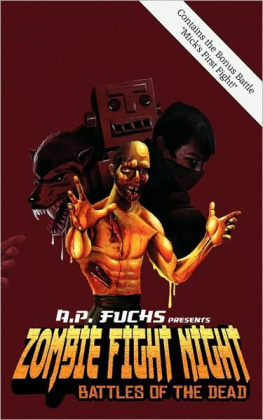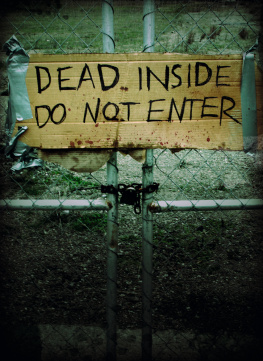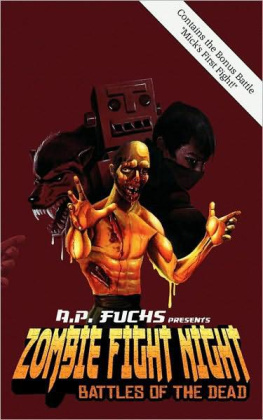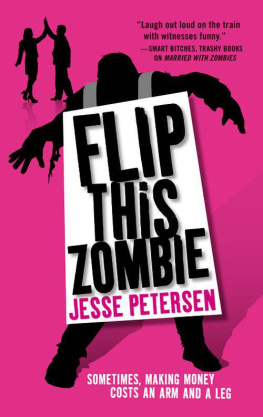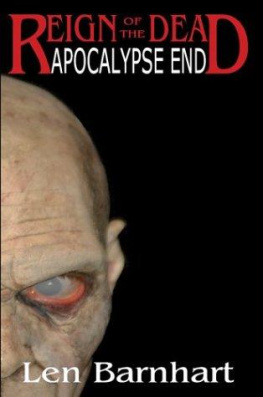APOCALYPSE of the DEAD
APOCALYPSE of the DEAD
JOE MCKINNEY

PINNACLE BOOKS
KENSINGTON PUBLISHING CORP.
www.kensingtonbooks.com

All copyrighted material within is Attributor Protected.
For Clay McKinney and David Snell.
Thanks for making it happen.
ACKNOWLEDGMENTS
Were about to take a long walk together through the wasteland, but before we get started I want to take a moment to thank a few people who deserve a lot more than the mere mention Im about to give them. No book is ever a solo journey, and this one was no exception. These kind folks helped me get from beginning to end:
Jacob Kier, David Snell, Arthur Casas, Jim Donovan, Gary Goldstein, Lisa Morton, David Wellington, Brian Keene, Kevin Luzius, Amy Grech, Bruce Boston, Marge Simon, Mitchel Whitington, Michelle McCrary, Tobey Crockett, Mark Onspaugh, Mark Kolodziejski, Michael McCarty, Lee Thomas, Charlie Delgado, Michael Starnes, Adam Zeldes, Donald Strader, Gabrielle Faust, Shawn and Grady Hartman, Joe and Jennifer McKinney, Alexander Devora, Tiffany and Clay McKinney, Thomas McAuley, Beckie Ugolini, Caren Creech, Joel Sutherland, Harry Shannon, Kim Paffenroth, Matt Staggs, Angie Hawkes, Chris Fulbright, Greg Lamberson, Corey Mitchell, Michelle McKee, Ray Castillo, A. Lee Martinez, John Picacio, Sanford Allen, Matt Louis, Norman Rubenstein, Richard Dean Starr, Michelle Mondo, David Pruitt, Steven Wedel, John Joseph Adams, Nate Kenyon, Bev Vincent, Brian Freeman, Louise Bohmer, Weston Ochse, Judy Comeau, Graeme Flory, Fran Fiel, and Gene ONeill.
And, as always, to my lovely wife, Kristina, and my daughters, Elena and Brenna, who make this a world worth living in.
They asked him, then, whether to live or die was a matter of his own sovereign will and pleasure. He answered, certainly. In a word, it was Queequegs conceit, that if a man made up his mind to live, mere sickness could not kill him: nothing but a whale, or a gale, or some violent, ungovernable, unintelligent destroyer of that sort. HERMAN MELVILLE
CONTENTS
C HAPTER
Down there in the ruins it was low tide. Galveston Bay had receded, leaving the wreckage of South Houstons refineries and trailer parks up to their waists in black water. Moving over the destruction at eight hundred feet in a Schweizer 300, the thropping of the helicopters rotors echoing in his ears, Michael Barnes scanned the flooded ruins for movement. The Schweizer was little more than a pair of lawn chairs strapped to an engine, but its wide-open bubble cockpit offered an unobstructed view of what had been, before Hurricane Mardell ripped the skin off the city, a vast cluster of tankers and docks and refineries and arterial bayous, the breadbasket of Americas domestic oil and gas industry. Now the world below Michael Barness helicopter looked like a junkyard that had tumbled down a staircase.
Flying over the flooded city, Barnes remembered what it was like after the storm, all those bodies floating in the streets, how they had bloated and baked in the sun. He remembered the chemical fires from the South Houston refineries turning the sky an angry red. A green, iridescent chemical scum had coated the floodwaters, making it shimmer like it was alive. That mixture of rotting flesh and chemicals had produced a stench that even now had the power to raise the bile in his throat.
What he didnt knowwhat nobody knew, at the timewas the awful alchemy that was taking place beneath the floodwaters, where a new virus was forming, one capable of turning the living into something that was neither living nor dead, but somewhere in between.
Before the storm, Barnes had been a helicopter pilot for the Houston Police Department. Grounded by the weather, hed been temporarily reassigned to East Houston, down around the Galena Park area, where the seasonal floods were traditionally the worst. The morning after the storm, hed climbed into a bass boat with four other officers and started looking for survivors.
Everywhere he looked, people moved and acted like theyd suddenly been transported to the face of the moon. Their clothes were torn to rags, their faces glazed over with exhaustion and confusion. Barnes and his men didnt recognize the first zombies they encountered because they looked like everybody else. They moved like drunks. They waded through the trash-strewn water, stumbling toward the rescue boats, their hands outstretched like they were begging to be pulled aboard.
The city turned into a slaughterhouse. Cops, firefighters, National Guardsmen, and Red Cross volunteers went in thinking theyd be saving lives but emerged as zombies, spreading the infection throughout the city. Barnes considered himself lucky to have escaped. When the military sealed off the Gulf Coast, theyd trapped hundreds of thousands of uninfected people inside the wall with the zombies. Barnes emerged with his life, and his freedom; nearly two million people werent so lucky.
And with the rest of America in an unstoppable economic nosedive after the death of its domestic oil, gas, and chemical industries, he considered himself lucky to get a job with the newly formed Quarantine Authority, a branch of the Office of Homeland Security that was assigned to protect the wall that stood between the infected and the rest of the world.
But all that was two years ago. It felt like another lifetime.
Today, his job was a routine sweep with the Coast Guard. Earlier that morning, a surveillance plane had spotted a small group of survivorsknown as Unincorporated Civilian Casualties by the politicians in Washington, but simply as uncles by the flyboys in the Quarantine Authorityworking to wrest a wrecked shrimp boat loose from a tangle of cables and nets and overgrown vegetation. Most of the boats left in the Houston Ship Channel were half-sunken wrecks. And what hadnt sunk was hopelessly, intractably mired in muck and garbage. There was no chance at all that a handful of uncles could get a boat loose from all that mess and make a run for it. And even if they could, theyd never be able to beat the blockade of Coast Guard cutters waiting just off shore. Theyd be blasted out of the water before they lost sight of land. But the Quarantine Authoritys mission was to make sure nobody escaped from the zone, and so the order had gone out, as it had numerous times before, to mobilize and neutralize as necessary.
Now, along with three other pilots from the Quarantine Authority, Barnes was slowly moving south toward the Houston Ship Channel. Once there, theyd rendezvous with the boys from the Coast Guards Helicopter Interdiction Tactical Squadron, known as HITRON, and act as forward observers while the H-Boys took care of any survivors who might be trying to escape to the Gulf of Mexico.
Good Gawd, would you look at them? said Ernie Faulks, one of the Quarantine Authority pilots off to Barness right. In the old days, Faulks had made his living flying helicopters back and forth from the oil rigs just offshore. He was an irredeemable redneck, but cool under pressure, especially in bad weather.
Barnes glanced up from the ruins below and saw a string of seven orange-and-white Coast Guard helicopters closing on their position. Even from a distance, Barnes could pick out the silhouettes of the HH-60 Jayhawks and the HH-65 Dolphins.
You know what those babies are? said Paul Hartle, a former HPD pilot and Barness preferred flanker. Those are chariots of the gods, my friend. Aint a helicopter made that can hold a candle to those bad boys.
Id love to fly one of them things, answered Faulks. I bet theyre faster than your sister, Hartle. Sure are prettier.
Fuck you, Faulks.
Next page
